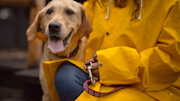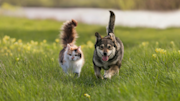Pets and children: ideas to create a safe and happy home for everyone
Pet vet: your questions answered

If you’re worried about your pet’s wellbeing, Bristol-based veterinary surgeon Dr James Greenwood is on hand to address your concerns and answer common questions.
Separation anxiety
It’s important to say that there is a difference between those dogs that would normally cope with being left alone and those suffering from true separation anxiety.
Separation anxiety is a complicated and stressful condition for both dog and owner, which can cause an animal that’s left alone to become destructive and bark all day long.
If you’re concerned your dog has separation anxiety, seek help from the Association of Pet Behaviour Counsellors (APBC) and enlist a clinical pet behaviourist.
Otherwise, there’s lots of things you can do to help your pet remain calm whilst you're away. Allocate some time when you keep them in one room while you go into a different part of the house or leave altogether. This will get them used to spending some time alone.
Once your pet gets more confident, gradually increase the amount of time you leave them. It’s also important to leave something to occupy their senses while you’re not there, like turning the radio on or scattering bits of food around the house.
Socialising puppies
When we socialise puppies, we’re teaching them that there is no reason to fear particular situations or scenarios like encountering traffic, meeting lots of people or travelling in the car.
Socialising with other dogs is the perfect way for young puppies to learn interactive play and pick up good habits, but it’s not a free for all. This time must be supervised carefully and as their owner you need to remind them that you are their first port of call.
Mark good behaviour by giving your pet a treat and ignore bad behaviour. Doing this will help them learn how to interact with people and other dogs.
Unhealthy poops
If your dog is bright, happy and still drinking water (and it’s only a single incident of diarrhoea), you can withhold their normal food and offer them small, frequent portions of something blank like cooked chicken mixed with boiled rice. You can also buy tinned food from your vet that helps with poorly tummies.
Simple cases of loose, sloppy poo will often sort themselves out within 24 hours. If it goes on for longer, turns bloody or there are other symptoms such as vomiting, lethargy, weight loss or a loss of appetite, then you should contact a vet.
Loss of appetite
Pets can be off their food at times, especially cats as they need a lot more variation in their diet than dogs. If you haven’t tried other foods, it might be worth changing up the menu.
However, if a cat doesn’t eat for more than a day or so, it could lead to a secondary liver condition. So, it’s important to identify what’s behind the loss of appetite as quickly as possible.
It might be that eating is causing discomfort, so it's worth getting their teeth checked by a vet as dental disease is very common in cats.
If a loss of appetite is combined with weight loss, vomiting, drinking or weeing a lot, that indicates there is a background cause that needs to be investigated.
Noise phobias
The loud noises associated with events like Bonfire Night can cause animals distress, but it is possible to prepare your dog well before the event. Playing a sound–desensitisation CD at a low volume is a good way to get them used to the sound of bangs and crackles.
Remember to follow positive reinforcement too. If your pet starts to get a bit panicky, reassure them and provide a safe hiding place they can escape to. Noise phobias can be complicated to overcome, so you may need to enlist a clinical pet behaviourist.
There’s also effective medication for reducing anxiety during or after a noisy event. It’s definitely worth speaking to your vet about this, because noise phobias are very stressful for dogs and it’s horrible to see them visibly upset. You could also try dietary supplements that have a calming effect or appeasing collars.
Meet Dr James Greenwood
A familiar face on CBBC’s The Pets Factor, James launched his own podcast called Vet Together in 2020 to offer advice and invite celebrity guests to discuss their pet’s adorable antics. For more animal updates, follow James on Instagram and X @drjgreenwood.
Exclusive offers for Co-op Members

Pet insurance
Co-op Members get 5% off pet insurance.
5% discount applies only to the first year as an introductory offer. Minimum yearly costs apply to receive 5% discount: £51.59 for dogs, £50.68 for cats. Offers may be changed or withdrawn at any time.




